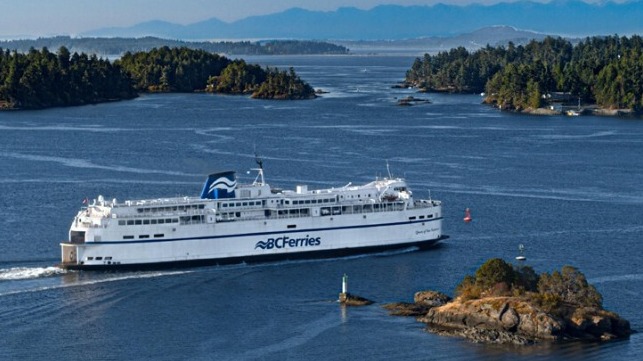60-Year-Old Ferry Loses Prop as BC Ferries Struggles with Aging Fleet

Canada’s BC Ferries is increasingly feeling the pressure of operating an aging fleet after one of its flagship vessels lost its propeller, leading to service cancelations coming at the end of a busy summer season. The ferry operator that bills itself as one of the largest in the world is working to manage one of the oldest operating fleets.
The latest problems began on September 3, when BC Ferries reported the 60-year-old Queen of New Westminster was out of service after experiencing operating problems. The vessel, which can carry over 1,300 passengers and 250 cars, sails between Victoria (Swartz Bay) and Vancouver (Tsawwassen).
The following day, BC Ferries announced that divers had completed a survey and discovered one of the vessel’s propellers had sheared off from its propulsion shaft. Though divers have been able to locate the propeller and plans are underway for its recovery, the 426-foot-long ferry has been forced into an unscheduled shipyard visit for repairs. In addition, news reports said the vessel dumped a total of 800 liters of hydraulic oil when the starboard prop broke away, but BC Ferries insists it is a light oil that quickly disperses.
As one of the workhorse ferries providing regular service, the roll-on, roll-off passenger ferry will be out of service at least for September as it goes to Esquimalt Dry Dock Company for repairs. The company admits it is looking for “suitable spares” saying the work may be delayed by the availability of parts.
This comes after the ferry operator recorded its busiest season this summer in its 64-year history. In June and July, over five million passengers and two million vehicles traveled on the ferry network.
Queen of New Westminster is the last of a series of seven Victoria-class ferries. Although having gone through several major renovations, the vessel was launched in 1964. Westminster is among seven aging vessels that BC Ferries has lined up for annual repairs, refits, and maintenance over the next three months. They include the almost 50-year-old Queens of Alberni, Coquitlam, and Cowichan which together with Westminster are due to be retired but must continue for a few more years before new vessels will be delivered.
BC Ferries has admitted that although operating an aging fleet is bringing about significant challenges and operational hurdles, the company says it is focused on minimizing customer impact while strategically planning for future demand. The company says the challenges are now unexpected considering how long the six oldest vessels in the fleet have been in service.
“This refit season is a vital part of BC Ferries' ongoing commitment to safety, service, and fleet modernization. The company’s priority continues to be on fleet reliability and investing in the future through its long-term vessel renewal strategy,” said BC Ferries in a statement.

that matters most
Get the latest maritime news delivered to your inbox daily.
Owing to the increasing frequency of mechanical issues challenging its aging vessels, the operator is implementing a comprehensive vessel renewal strategy that includes the introduction of new major vessels and the planned expansion of the size of the fleet, adding one net new vessel to service the major routes.
The operator highlighted that soon it will be publishing a request for proposals for seven new vessels that will have the capacity to carry up to 360 vehicles and 2,100 passengers. The newbuilds will be critical in meeting the growing demand, ensuring service reliability, and reducing disruptions. The new vessels will be bigger compared to the retiring ferries whose capacity is 250-310 vehicles and 1,200-1,500 passengers. The seven new ferries however are not expected to enter operations until starting in 2029.
